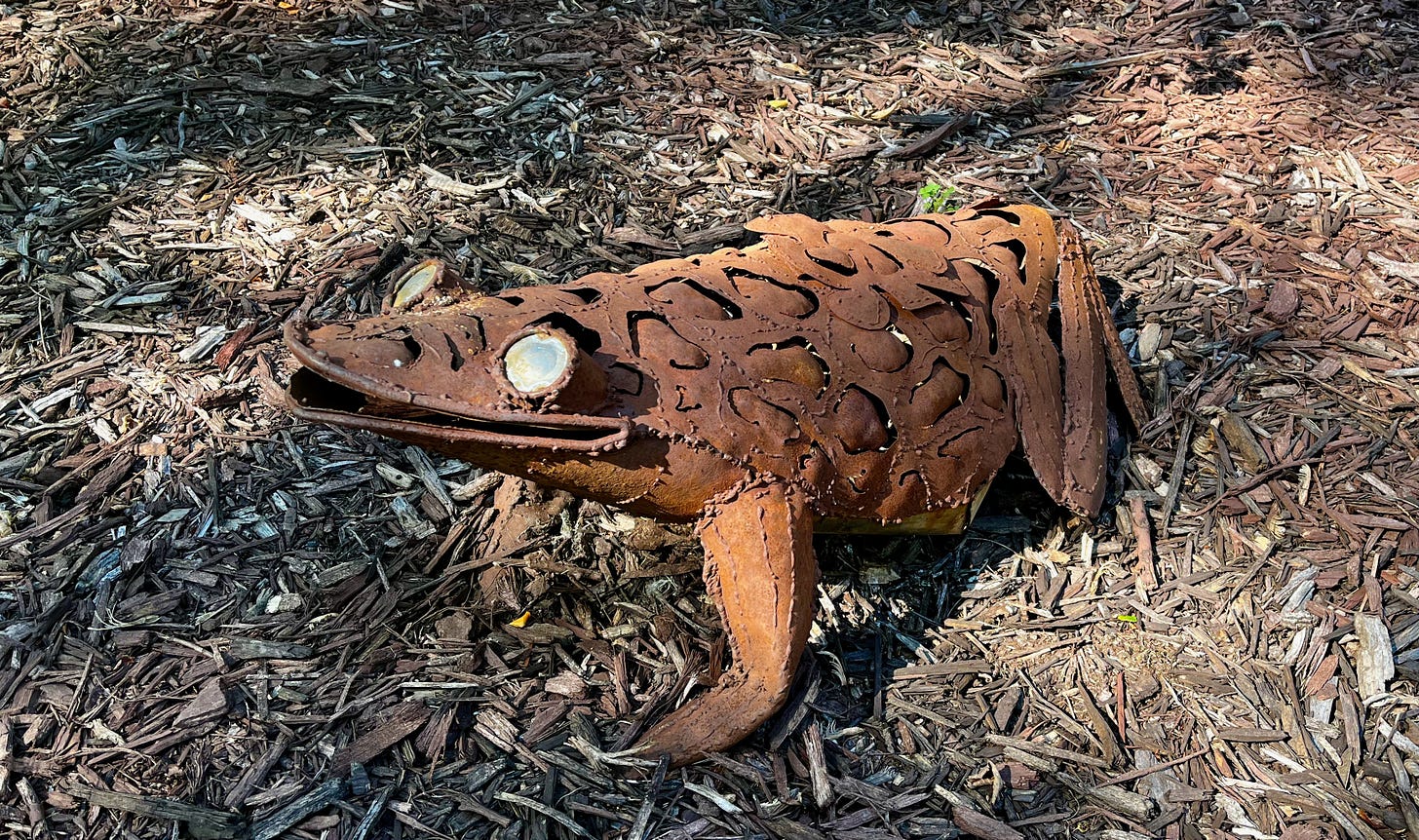The little boy walks by the house often, he and his mother. Sometimes a dog is in tow. And while Mom waits near the big trees at the edge of the sidewalk, the toddler, with blades of fresh grass in his hand, steps gingerly along the walkway to the mulched corner near our home’s front door. On the ground sits a big metal—tin, maybe—frog. It’s about two-and-a-half feet long, weathered to a dirty bronze color, and it’s mouth is slightly open, just enough to be fed some tasty grass. And that’s what the boy does. With care and caution, he feeds the frog, then taps it on its head as if to say, “good boy.” Then without fail, he waves goodbye to the frog as he and his mother move down the sidewalk away from the house.
For over a year he’s been feeding the frog. He never misses a chance. It’s essential work.
My wife and I smile as we silently watch from the window. To us it is clear that the boy believes his greeting and feeding is a life-sustaining act, important, and even ritualistic. But the other day when he stopped by, I couldn’t help wonder when he would no longer hold the blades in his hand and offer them to the frog. When would it end? When will his innate delight with this metal yard ornament fade for good? When will “growing up” change his perspective, no longer finding joy in this simple act?
The loss of innocence has been called one of the great tragedies of the human condition. Our ability to hold onto the magic we are given when we experience something new vanishes as we grow up. As we age, we question that newness. Even find it threatening. We smile when we see children playing and laughing, because we are remembering how glorious it felt when innocence was ours. We are witnessing innocence awakened and embraced without a single thought that it would or could be anything else. It’s lovely, but it’s also heartbreaking. We know that the light those children exist in now will eventually become less bright as the world slowly turns the knob on our dimmer switch. It all begins to fade—Santa Claus, the Tooth Fairy. They all go away. Everything changes.
Soon, we learn about fear, about restrictions, and about vulnerability. We learn to hide our fragility and we learn how manipulation can get us what we want. We figure out when to lie and when to tell the truth. We live within societal roles of what’s appropriate. And maybe more than anything, we give up the beauty of the present moment. Like animals, children live in the present, always. And the present is the wonderland of innocence. When we stop existing there, we lose innocence. “Oh, to be a child again,” we say, “when everything seemed possible.”
The other day, I heard a national radio news report from Eastern Kentucky that focused on a local family who had lost nearly everything in the recent devastating flooding there. The baby of the family, a four-year-old girl told the reporter that she knew that everything would be okay. “Why?” the reporter asked. “You’ve lost all of your possessions. Your home, all of it.” The little girl said that none of that mattered. “You see,” she said, “I found a lucky penny. It was in the dirt where our house used to be. Everything is going to be all right.”
The world still needs the innocence of that little girl. It needs the boy who feeds the big yard frog. And it needs us to remember that innocence is not ignorance. It should not be calculated by our age, or by accumulated knowledge or by the number of experiences in our years. Innocence is too precious to be left to children. Too important. Rediscovering it as an adult should not be considered a weakness; it’s not naiveté. Holding on to a level of innocence is the essence of hope. Innocence breeds hope. And hope sustains us.
Goodness knows we need this now more than ever.





As always David, reflective truth that strikes deeply in the chords of our soul. Thank you.